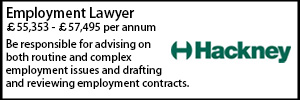Care sector handling more disciplinaries and grievances than other sectors, survey finds
- Details
Care sector employers have to deal with a significantly higher number of disciplinaries and grievances than other sectors, according to research by law firm Birketts.
In collaboration with Opinion Matters, Birketts surveyed 500 HR professionals in England and Wales (100 of them from the care sector), on their experiences with the employment tribunal process over the preceding 24 months.
The research, published on Tuesday (27 May), showed that disciplinaries were noticeably higher in care sector businesses than in other sectors surveyed.
On average, respondents from the care sector reported 53 disciplinary matters over the preceding 24 months, compared with an average of 37 across all sectors, the report said.
The number of grievances was also 29% higher in care sector businesses when compared with all sectors, with respondents indicating that managing grievances was the area in which they thought line managers needed the most support.
The research meanwhile found that unfair (including constructive) dismissal and disability discrimination were the most common employment tribunal claims brought against care businesses.
Forty-eight per cent of care sector claims were resolved at a full employment tribunal hearing, and those in the care sector reported a higher rate of successfully defending claims brought against them (30%) than the average across all sectors (25%).
Only 16% of respondents from the care sector reported any cases being struck out by the employment tribunal, compared with 23% of respondents across all sectors.
Responding to questions on the Acas early conciliation process, which gives both parties a chance to resolve the dispute before going to tribunal, just over half (56%) of those who chose not to engage in the process said they took the decision because they believed it would either not resolve the issue or be a waste of time.
In contrast, settlement via Acas once the employment tribunal process had started, was reported by 31% of care sector respondents, the most frequent conclusion to claims brought against the business once they had commenced.
Commenting on the findings, Catherine Johnson, a partner at Birketts, said the uncertain economic outlook, the impact of the recent budget and the forthcoming Employment Rights Bill have made it "essential for care sector employers to limit the risks and costs associated with handling employment tribunal claims".
She said: "The introduction of 'day one' rights for employees to claim unfair dismissal under the Employment Rights Bill, together with the extended time limit for bringing a claim, means that we are likely to see a marked increase in the number of employment tribunal claims.
"This will add to the existing backlog of claims in the system, resulting in even longer delays before cases are listed for hearing."
The report comes as the Association of Directors of Adult Social Services (ADASS) warned that reforms in the Government's Immigration White Paper published earlier this month could impact recruitment in the care sector.
The membership body said plans in the white paper to ban the recruitment of adult social care workers from abroad could lead to a shortage of workers and force providers to rely on expensive agency staff.
Adam Carey










